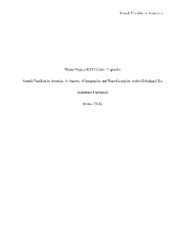Somali Families in America: a Journey of Integration and Transformation in the Globalized Era
Abstract
Somali Refugees make up a growing population in urban parts of America. Researchers have examined the integration and assimilation processes of refugees, yet this study acts to highlight the intricacies of culture, situation, interaction, and context as they relate to these processes. This study serves to reflect on the complex cultural interactions between the white European- American educator and the Somali refugee. It was important for this author, being a white-European educator, to use personal reflection in this study in order to acknowledge and deconstruct cultural biases informed by the context of privilege. These biases impact how the white European -American educator views and interacts with children and families and also influences the methodological route of a research project. Concepts of power balancing, community space use, and integration in the context of education were discussed. It was found that in order to best study, develop, and interact in this integration process it is necessary for each party to step into the cultural unknown and undergo a process of integration and transformation. This requires openness to deconstructing one’s own cultural bias which can only occur in context of mutual and balanced relationships.
Original item type
Microsoft Word (DOCX)
Original extent
48 pages
Subject
Collections
Copyright
This original work is protected by copyright. Copyright is retained by the author(s). Works may be viewed, downloaded, or printed, but not reproduced or distributed without author(s) permission.


 Maintained by the Northwest University Library
Maintained by the Northwest University Library